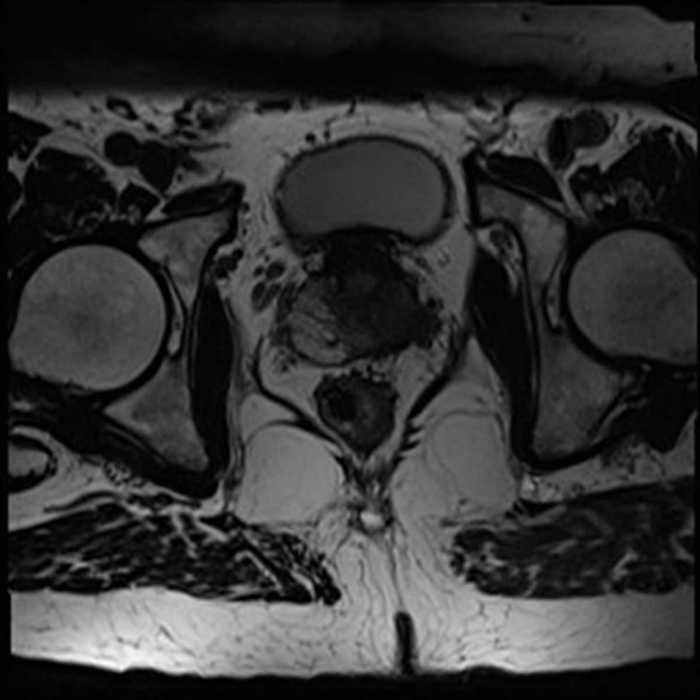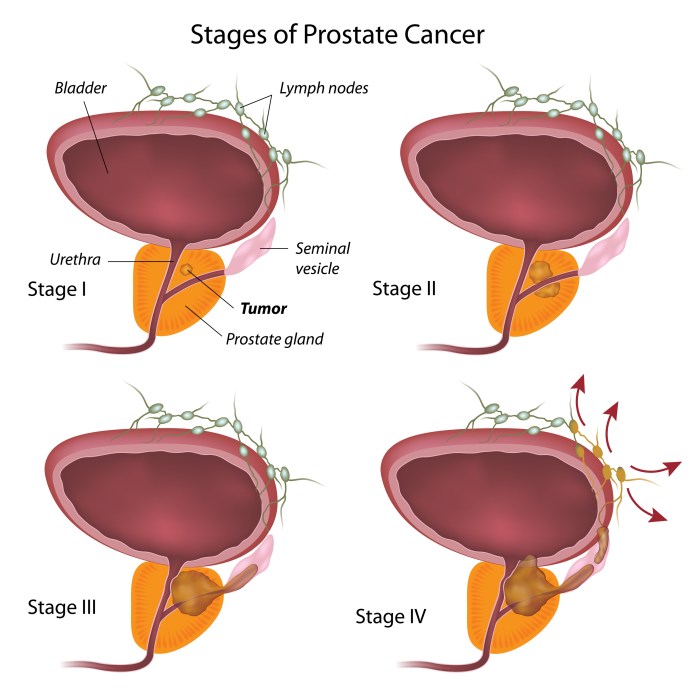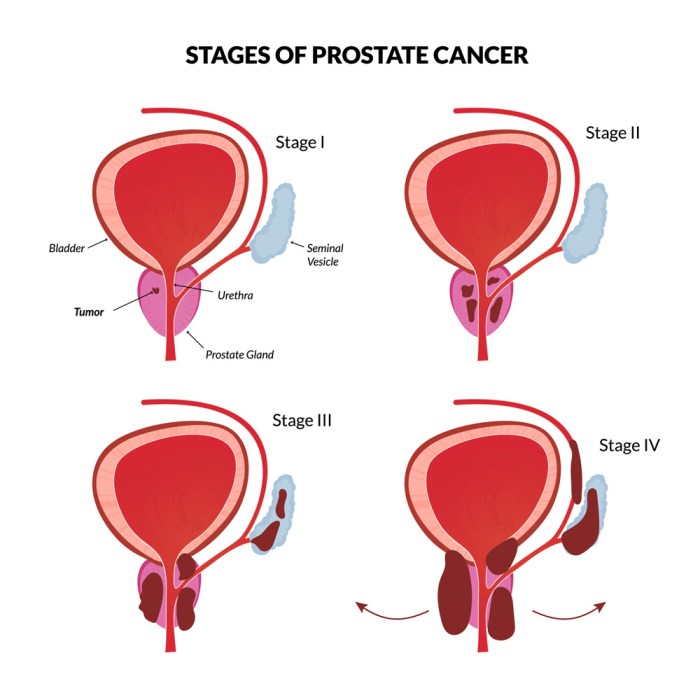What is the best treatment for extracapsular extension prostate cancer? This question is a pressing one for many men who have been diagnosed with this condition. Extracapsular extension (ECE) occurs when prostate cancer spreads beyond the prostate gland and into the surrounding tissues.
This can make treatment more challenging and may affect the prognosis.
There are a number of different treatment options available for ECE prostate cancer, and the best option for each individual patient will depend on a number of factors, including the stage of the cancer, the patient’s overall health, and the patient’s preferences.
Definition of Extracapsular Extension Prostate Cancer (ECPC)
Extracapsular Extension Prostate Cancer (ECPC) is a type of prostate cancer that has spread beyond the prostate’s outer layer, known as the prostatic capsule. The prostatic capsule is a thin layer of tissue that surrounds the prostate gland. When prostate cancer cells break through this capsule, it is considered to be ECPC.
ECPC is a significant clinical concern because it indicates that the cancer has become more aggressive and has a higher risk of spreading to other parts of the body, a process known as metastasis.
Staging of ECPC
The staging of ECPC is based on the extent of the cancer’s spread beyond the prostatic capsule. The most commonly used staging system is the American Joint Committee on Cancer (AJCC) staging system, which categorizes ECPC into three stages:
- pT3a:The cancer has spread through the prostatic capsule but is confined to the prostate gland.
- pT3b:The cancer has spread through the prostatic capsule and into the surrounding tissues, such as the seminal vesicles.
- pT4:The cancer has spread beyond the prostate gland and into adjacent organs, such as the bladder or rectum.
Treatment Options for ECPC
Treatment for ECPC typically involves a combination of therapies tailored to the individual’s specific situation. The primary goal is to eliminate or control the cancer while preserving urinary and sexual function as much as possible.
The best treatment for extracapsular extension prostate cancer can be a challenging decision, but it’s important to consider all options. If you’re curious about whether you can donate eggs if your tubes are tied, there are resources available to help you learn more.
This article provides valuable information on the topic. Ultimately, the best treatment for extracapsular extension prostate cancer depends on individual circumstances, so it’s crucial to consult with a medical professional for personalized advice.
Treatment options may include:
Radical Prostatectomy
- Involves surgical removal of the prostate gland and surrounding tissues.
- May be an option if the cancer is confined to the prostate or has only minimally extended beyond the capsule.
- Can provide excellent long-term outcomes if the cancer is completely removed.
Radiation Therapy
- Uses high-energy beams to target and destroy cancer cells.
- Can be delivered externally (from outside the body) or internally (through radioactive implants placed near the tumor).
- May be used before or after surgery to improve outcomes.
Hormone Therapy
- Involves using medications to block the production or effects of male hormones (androgens) that fuel prostate cancer growth.
- Can help shrink the tumor and slow its spread.
- May be used alone or in combination with other therapies.
Chemotherapy
- Uses cytotoxic drugs to kill cancer cells throughout the body.
- May be used in advanced cases of ECPC to slow the cancer’s growth and alleviate symptoms.
- Can have significant side effects, so it is typically reserved for more aggressive cancers.
Cryotherapy
- Involves freezing the prostate gland to destroy cancer cells.
- May be an option for men who are not candidates for surgery or radiation therapy.
- Can be less invasive than other treatments but may have higher rates of urinary and sexual side effects.
Immunotherapy
- Uses the body’s immune system to fight cancer cells.
- May be an option for men with advanced ECPC who have not responded to other treatments.
- Still under development, but shows promise for improving outcomes.
Radical Prostatectomy for ECPC

Radical prostatectomy involves the surgical removal of the entire prostate gland, seminal vesicles, and surrounding lymph nodes. It is considered an option for men with ECPC who are otherwise healthy and have a life expectancy of at least 10 years.
Indications and Benefits
Radical prostatectomy may be indicated for men with:
- Confined ECPC
- Low-volume ECPC
- Intermediate-risk ECPC with a low PSA level
The benefits of radical prostatectomy include:
- Potential for cure in some cases
- Improved survival rates
- Reduced risk of metastasis
Risks and Complications
As with any surgical procedure, radical prostatectomy carries potential risks and complications, including:
- Erectile dysfunction
- Incontinence
- Urinary tract infections
- Bleeding
- Nerve damage
- Lymphedema
- Deep vein thrombosis
The risks and benefits of radical prostatectomy should be carefully weighed before making a decision about treatment.
Radiation Therapy for ECPC
Radiation therapy is a common treatment option for ECPC, as it can help to shrink the tumor and reduce the risk of it spreading to other parts of the body. There are two main types of radiation therapy used for ECPC: external beam radiation therapy (EBRT) and brachytherapy.EBRT
involves delivering radiation from a machine outside the body, while brachytherapy involves placing radioactive seeds or pellets directly into the prostate. Both types of radiation therapy can be effective in treating ECPC, but they have different advantages and disadvantages.
External Beam Radiation Therapy (EBRT)
EBRT is the most common type of radiation therapy used for ECPC. It is delivered using a machine that generates high-energy X-rays or protons. The radiation beams are aimed at the prostate from different angles, ensuring that the entire tumor is treated.EBRT
is a relatively painless procedure, but it can cause side effects such as fatigue, skin irritation, and urinary problems. These side effects are usually temporary and will go away after treatment is completed.
Brachytherapy
Brachytherapy is a type of radiation therapy that involves placing radioactive seeds or pellets directly into the prostate. This allows for a more targeted delivery of radiation to the tumor, reducing the risk of damage to surrounding tissues.Brachytherapy can be performed in two ways:* Permanent brachytherapy:Radioactive seeds or pellets are permanently implanted into the prostate.
Temporary brachytherapy
Radioactive seeds or pellets are placed into the prostate for a few days or weeks and then removed.Brachytherapy is a less common treatment option for ECPC than EBRT, but it can be more effective in certain cases. It is often used in combination with EBRT to improve the chances of successful treatment.
Hormonal Therapy for ECPC: What Is The Best Treatment For Extracapsular Extension Prostate Cancer
Hormonal therapy is a treatment approach that aims to reduce the levels of male hormones, primarily testosterone, in the body. In the context of prostate cancer, hormonal therapy plays a significant role in managing extracapsular extension prostate cancer (ECPC).
The rationale behind hormonal therapy for ECPC is to inhibit the growth and spread of cancer cells that are dependent on testosterone for their proliferation. By reducing testosterone levels, hormonal therapy can slow down the progression of the disease and improve patient outcomes.
Mechanisms of Action
Hormonal therapy exerts its effects by targeting the androgen receptor (AR), a protein that is present in prostate cancer cells. Testosterone and other androgens bind to the AR, triggering a cascade of events that lead to cell growth and proliferation.
While the best treatment for extracapsular extension prostate cancer remains a topic of ongoing research, it’s important to address any concerns about your health promptly. If you’re experiencing a sore throat, you may wonder if it warrants a visit to urgent care.
To help you make an informed decision, this article provides insights into the symptoms, causes, and when to seek medical attention for a sore throat. Returning to the topic of prostate cancer, further studies are needed to determine the most effective treatment strategies for extracapsular extension.
Hormonal therapy aims to block this process by:
- Suppressing testosterone production: Medications such as luteinizing hormone-releasing hormone (LHRH) agonists or antagonists can inhibit the production of testosterone in the testicles.
- Blocking androgen binding: Anti-androgen medications, such as bicalutamide or enzalutamide, prevent testosterone from binding to the AR, thereby inhibiting its effects on cancer cells.
Potential Side Effects
Hormonal therapy can cause a range of side effects, including:
- Hot flashes
- Loss of libido
- Erectile dysfunction
- Osteoporosis
- Cardiovascular complications
The severity and frequency of side effects vary depending on the specific medication used and the individual patient’s response. Regular monitoring and management by a healthcare professional are essential to mitigate potential adverse effects.
Chemotherapy for ECPC
Chemotherapy is a systemic treatment that uses drugs to kill cancer cells throughout the body. It is often used in combination with other treatments, such as surgery, radiation therapy, or hormonal therapy.
The drugs used in chemotherapy for ECPC include docetaxel, cabazitaxel, and mitoxantrone. These drugs work by damaging the DNA of cancer cells, causing them to die. Chemotherapy can be given intravenously (through a vein) or orally (by mouth).
Extracapsular extension prostate cancer requires specialized treatment, unlike the common cold or sore throat. For pregnant women, sore throats can be treated with lozenges or gargling with salt water. However, for extracapsular extension prostate cancer, the best treatment options include surgery, radiation therapy, and hormone therapy.
These treatments aim to remove or shrink the tumor and prevent its spread.
Side Effects of Chemotherapy
Chemotherapy can cause a variety of side effects, including:
- Nausea and vomiting
- Hair loss
- Fatigue
- Low blood counts
- Increased risk of infection
The side effects of chemotherapy can vary depending on the type of drug used, the dose, and the length of treatment. Your doctor will discuss the potential side effects with you before starting treatment.
Immunotherapy for ECPC
Immunotherapy is a promising treatment approach for ECPC that utilizes the body’s own immune system to fight cancer cells. Immunotherapy drugs work by stimulating or enhancing the immune response to target and eliminate cancer cells.
Types of Immunotherapy Drugs
- Immune Checkpoint Inhibitors:These drugs block immune checkpoints, which are molecules that normally prevent the immune system from attacking healthy cells. By blocking these checkpoints, immune cells are able to more effectively recognize and attack cancer cells.
- Adoptive Cell Therapy:This approach involves modifying a patient’s own immune cells, called T cells, to recognize and attack cancer cells. The modified T cells are then re-infused into the patient to fight the cancer.
- Cancer Vaccines:These vaccines are designed to stimulate the immune system to recognize and attack specific cancer antigens, which are molecules found on cancer cells.
The use of immunotherapy for ECPC is still in its early stages, but it has shown promising results in clinical trials. Immunotherapy drugs have been shown to improve survival rates, reduce tumor size, and alleviate symptoms in patients with ECPC.
However, immunotherapy drugs can also have side effects, such as fatigue, rash, diarrhea, and nausea. These side effects can range from mild to severe and may require treatment. It is important to discuss the potential benefits and risks of immunotherapy with your doctor before starting treatment.
Targeted Therapy for ECPC
Targeted therapy is a type of cancer treatment that uses drugs to target specific molecules involved in the growth and spread of cancer cells. In the case of ECPC, targeted therapy drugs can be used to block the growth of cancer cells or prevent them from spreading.
Types of Targeted Therapy Drugs
There are several different types of targeted therapy drugs that can be used to treat ECPC, including:
- Androgen deprivation therapy (ADT):ADT drugs block the production of testosterone, which is a hormone that can fuel the growth of prostate cancer cells.
- Anti-angiogenic drugs:Anti-angiogenic drugs block the formation of new blood vessels that supply tumors with oxygen and nutrients.
- PARP inhibitors:PARP inhibitors block the activity of an enzyme called PARP, which is involved in DNA repair. By blocking PARP, these drugs can make cancer cells more vulnerable to radiation therapy and chemotherapy.
Potential Benefits and Risks
Targeted therapy drugs can be an effective treatment for ECPC, but they can also have side effects. Some of the potential benefits of targeted therapy drugs include:
- Improved survival rates
- Reduced risk of cancer recurrence
- Improved quality of life
Some of the potential risks of targeted therapy drugs include:
- Fatigue
- Nausea and vomiting
- Diarrhea
- Skin rashes
- Increased risk of infection
The decision of whether or not to use targeted therapy drugs to treat ECPC should be made in consultation with a doctor.
Surveillance for ECPC

Regular follow-up is crucial after treatment for extracapsular extension prostate cancer (ECPC) to monitor for any signs of recurrence or progression. This involves a combination of physical exams, blood tests, and imaging studies.Surveillance methods for ECPC include:
Physical Exam
- Digital rectal exam (DRE) to check for any abnormalities in the prostate.
- Prostate-specific antigen (PSA) blood test to measure the levels of PSA, a protein produced by the prostate.
Imaging Studies
- Transrectal ultrasound (TRUS) to create images of the prostate and surrounding tissues.
- Magnetic resonance imaging (MRI) to provide detailed images of the prostate and nearby organs.
- Computed tomography (CT) scan to visualize the prostate and other pelvic structures.
Limitations of surveillance methods include:
- PSA tests can sometimes miss small or slow-growing tumors.
- Imaging studies may not always detect all recurrences, especially in the early stages.
- Surveillance can be costly and time-consuming.
Prognosis and Quality of Life in ECPC
The prognosis and quality of life in patients with extracapsular extension prostate cancer (ECPC) vary depending on several factors, including the extent of the cancer, the presence of other medical conditions, and the patient’s age and overall health.
In general, patients with ECPC have a worse prognosis than those with localized prostate cancer. However, advances in treatment have improved the outlook for patients with ECPC, and many men can live for many years with the disease.
Factors Influencing Prognosis
Several factors can influence the prognosis of patients with ECPC, including:
- The extent of the cancer: Patients with more extensive cancer have a worse prognosis than those with less extensive disease.
- The presence of other medical conditions: Patients with other medical conditions, such as heart disease or diabetes, have a worse prognosis than those without these conditions.
- The patient’s age and overall health: Younger patients and those with better overall health have a better prognosis than older patients and those with poorer overall health.
Quality of Life, What is the best treatment for extracapsular extension prostate cancer
The quality of life of patients with ECPC can be affected by several factors, including:
- The side effects of treatment: Treatment for ECPC can cause side effects, such as urinary incontinence, erectile dysfunction, and fatigue. These side effects can impact the patient’s quality of life.
- The emotional impact of the disease: ECPC can be a life-changing diagnosis. Patients may experience anxiety, depression, and other emotional challenges.
- The patient’s support system: Patients with a strong support system have a better quality of life than those without a support system.
Wrap-Up

The treatment of ECE prostate cancer is a complex and challenging issue. There is no one-size-fits-all approach, and the best treatment plan for each individual patient will depend on a number of factors. However, by carefully considering the available options and working closely with their doctor, patients can make informed decisions about their care and improve their chances of a successful outcome.
Expert Answers
What is the prognosis for ECE prostate cancer?
The prognosis for ECE prostate cancer depends on a number of factors, including the stage of the cancer, the patient’s overall health, and the patient’s response to treatment. In general, the prognosis for patients with ECE prostate cancer is worse than for patients with localized prostate cancer.
However, with advances in treatment, the prognosis for patients with ECE prostate cancer has improved in recent years.
What are the side effects of treatment for ECE prostate cancer?
The side effects of treatment for ECE prostate cancer can vary depending on the type of treatment used. Common side effects of radical prostatectomy include erectile dysfunction, incontinence, and bowel problems. Common side effects of radiation therapy include fatigue, skin irritation, and diarrhea.
Common side effects of hormonal therapy include hot flashes, weight gain, and mood changes. Common side effects of chemotherapy include nausea, vomiting, and hair loss.
What are the benefits of treatment for ECE prostate cancer?
The benefits of treatment for ECE prostate cancer can include improved survival, reduced symptoms, and improved quality of life. Treatment can also help to prevent the cancer from spreading to other parts of the body.






